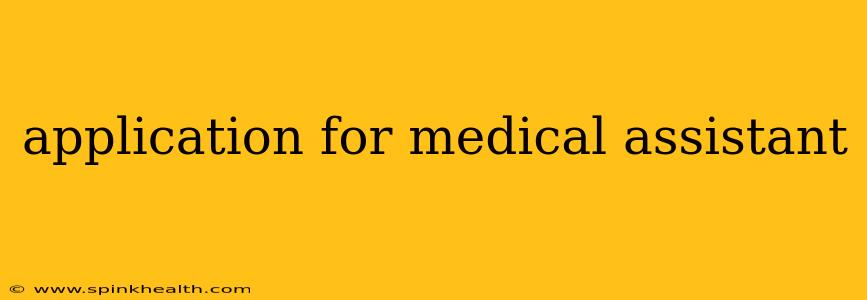Landing Your Dream Medical Assistant Job: Crafting the Perfect Application
The crisp white paper felt strangely heavy in my hand. Years of studying, late nights spent cramming, and countless hours shadowing doctors – it all culminated in this moment. I was applying for my dream job as a Medical Assistant. The weight wasn't just from the paper; it was the weight of expectation, the weight of hope, the weight of my future. This wasn't just another application; it was my story, my skills, and my ambition all condensed onto a few carefully chosen words. And I knew, to stand out, my application needed to be exceptional. This is what I learned along the way, and what I want to share with you.
What Makes a Medical Assistant Application Stand Out?
Your application is your first impression. It's your chance to showcase not only your qualifications but also your personality and your passion for healthcare. Think of it as a compelling narrative that demonstrates why you are the ideal candidate. It’s not just about ticking boxes; it's about captivating the hiring manager.
This isn't just about listing skills; it's about showing how you'll use them to benefit the practice.
How to Structure Your Application for Maximum Impact
1. The Resume: A Concise and Powerful Summary of Your Experience
-
Keywords are Key: Use relevant keywords throughout your resume, mirroring the language used in the job description. Think terms like "phlebotomy," "EKG," "vital signs," "medical terminology," "electronic health records (EHR)," and "patient care." These keywords help Applicant Tracking Systems (ATS) identify your application as a potential match.
-
Quantify Your Achievements: Don't just list your responsibilities; showcase your accomplishments. Instead of saying "Assisted physician with patient examinations," try "Assisted physician with over 100 patient examinations per month, contributing to a 15% increase in patient satisfaction scores." Numbers speak volumes!
-
Tailor it to Each Job: Generic resumes rarely impress. Customize your resume for each position, highlighting the skills and experiences most relevant to the specific job description.
2. The Cover Letter: Your Story, Your Passion, Your Fit
-
Personalize It: Avoid generic greetings. Research the hiring manager (if possible) and address them by name. This shows you've taken the time to personalize your application.
-
Show, Don't Just Tell: Don't simply state your skills; illustrate them with relevant examples from your experience. Did you successfully de-escalate a tense situation with an anxious patient? Did you efficiently manage multiple tasks during a busy clinic day? Share those stories!
-
Highlight Your Soft Skills: Medical assistants need strong interpersonal, communication, and teamwork skills. Emphasize your ability to empathize with patients, communicate effectively with colleagues, and work collaboratively within a team environment.
-
Express Enthusiasm: Let your passion for healthcare shine through! Conclude by reiterating your interest and highlighting your eagerness to contribute to the practice's success.
Frequently Asked Questions (FAQs) about Medical Assistant Applications
What certifications are important for medical assistants?
Many employers prefer candidates with certifications like the Certified Medical Assistant (CMA) or Registered Medical Assistant (RMA). These demonstrate competency and commitment to the profession. Check the job description for specific requirements.
What skills should I highlight in my application?
Highlight both clinical and administrative skills. Clinical skills might include phlebotomy, EKG, vital signs measurement, and assisting with examinations. Administrative skills might include scheduling appointments, managing patient records, and handling insurance claims. Again, focus on what the job description prioritizes.
How do I answer behavioral interview questions effectively?
Prepare for behavioral interview questions (e.g., "Tell me about a time you made a mistake"). Use the STAR method (Situation, Task, Action, Result) to structure your responses, focusing on your actions and the positive outcomes. Practice your responses beforehand!
How important is my experience?
While experience is valuable, many entry-level positions exist. Highlight relevant skills gained through volunteer work, internships, shadowing, or coursework. Demonstrate your eagerness to learn and your commitment to the profession.
What are some common mistakes to avoid?
Avoid typos and grammatical errors! Proofread your application carefully. Don't submit a generic application. Tailor your resume and cover letter to each position. And never underestimate the power of a strong first impression.
Applying for a medical assistant position is a journey, but a journey filled with purpose and the potential to make a real difference in people’s lives. With a carefully crafted application that highlights your skills, experience, and passion, you'll increase your chances of landing your dream job and starting an exciting and rewarding career. Remember, your application is your story – make it a compelling one!

